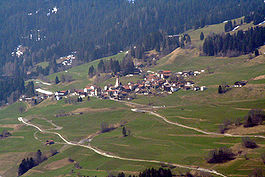Sarn, Switzerland
Sarn | |
|---|---|
 Sarn from the air | |
| Coordinates: 46°43′N 9°24′E / 46.717°N 9.400°E | |
| Country | Switzerland |
| Canton | Graubünden |
| District | Hinterrhein |
| Area | |
• Total | 7.60 km2 (2.93 sq mi) |
| Elevation | 625 m (2,051 ft) |
| Population (December 2007) | |
• Total | 142 |
| • Density | 19/km2 (48/sq mi) |
| Time zone | UTC+01:00 (Central European Time) |
| • Summer (DST) | UTC+02:00 (Central European Summer Time) |
| Postal code(s) | 7423 |
| SFOS number | 3666 |
| ISO 3166 code | CH-GR |
| Surrounded by | Portein, Präz, Safien, Tartar |
| Website | www |
Sarn was a municipality in the district of Hinterrhein in the Swiss canton of Graubünden. On 1 January 2010 the municipalities of Portein, Präz, Sarn, and Tartar merged into the municipality of Cazis.[1]
History
Sarn is first mentioned in 1156 as Sarn.[2]
Geography
Sarn has an area, as of 2006, of 7.6 km2 (2.9 sq mi). Of this area, 78.9% is used for agricultural purposes, while 15.1% is forested. Of the rest of the land, 3.2% is settled (buildings or roads) and the remainder (2.8%) is non-productive (rivers, glaciers or mountains).[3]
The municipality is located in the Thusis sub-district, of the Hinterrhein district. It consists of the haufendorf (an irregular, unplanned and quite closely packed village, built around a central square) village of Sarn on the Heinzenberg mountains. The municipalities of Portein, Präz, Sarn, and Tartar merged on 1 January 2010 into the municipality of Cazis.
Demographics
Sarn has a population (as of 2007) of 142, of which 8.5% are foreign nationals. Over the last 10 years the population has decreased at a rate of -15.5%.[3]
As of 2000, the gender distribution of the population was 51.4% male and 48.6% female.[4] The age distribution, as of 2000, in Sarn is; 27 people or 17.0% of the population are between 0 and 9 years old. 14 people or 8.8% are 10 to 14, and 9 people or 5.7% are 15 to 19. Of the adult population, 8 people or 5.0% of the population are between 20 and 29 years old. 25 people or 15.7% are 30 to 39, 26 people or 16.4% are 40 to 49, and 16 people or 10.1% are 50 to 59. The senior population distribution is 18 people or 11.3% of the population are between 60 and 69 years old, 14 people or 8.8% are 70 to 79, there are 2 people or 1.3% who are 80 to 89.[5]
In the 2007 federal election the most popular party was the SVP which received 51.5% of the vote. The next three most popular parties were the FDP (18.1%), the FDP (18.1%) and the CVP (11.7%).[3]
The entire Swiss population is generally well educated. In Sarn about 71% of the population (between age 25-64) have completed either non-mandatory upper secondary education or additional higher education (either University or a Fachhochschule).[3]
Sarn has an unemployment rate of 0%. As of 2005, there were 39 people employed in the primary economic sector and about 12 businesses involved in this sector. 10 people are employed in the secondary sector and there is 1 business in this sector. 7 people are employed in the tertiary sector, with 6 businesses in this sector.[3]
The historical population is given in the following table:[2]
| year | population |
|---|---|
| 1850 | 259 |
| 1900 | 150 |
| 1950 | 168 |
| 2000 | 159 |
Languages
Most of the population (as of 2000) speaks German (97.5%), with Italian being second most common ( 1.9%) and English being third ( 0.6%).[3]
| Languages | Census 1980 | Census 1990 | Census 2000 | |||
|---|---|---|---|---|---|---|
| Number | Percent | Number | Percent | Number | Percent | |
| German | 115 | 89.15% | 144 | 97.30% | 155 | 97.48% |
| Romanish | 11 | 8.53% | 4 | 2.70% | 0 | 0.00% |
| Italian | 3 | 2.33% | 0 | 0.00% | 3 | 1.94% |
| Population | 129 | 100% | 148 | 100% | 159 | 100% |
References
- ^ Amtliches Gemeindeverzeichnis der Schweiz, Mutationsmeldungen 2009 / Répertoire officiel des communes de Suisse, Mutations 2009 / Elenco ufficiale dei Comuni della Svizzera, Mutazione 2009 (PDF) (Report). Federal Statistical Office. 2009. nden. Archived from the original (PDF) on 18 November 2010. Retrieved 6 March 2010.
- ^ a b Sarn in German, French and Italian in the online Historical Dictionary of Switzerland.
- ^ a b c d e f Swiss Federal Statistical Office Archived 2011-09-04 at the Wayback Machine accessed 7 October 2009
- ^ Graubunden in Numbers Archived 2009-09-24 at the Wayback Machine (in German) accessed 21 September 2009
- ^ Graubunden Population Statistics Archived 2009-08-27 at the Wayback Machine (in German) accessed 21 September 2009




